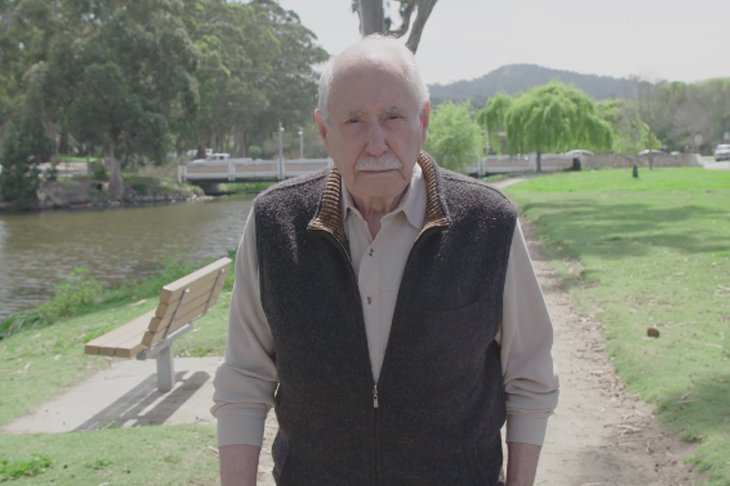Let’s be honest – the best part of primary season is seeing just how wild some of the fringe candidates are. Every election cycle throws up a few quixotic single-issue mavericks without a hope in hell of actually securing the nomination. Such campaigns are usually admirable attempts to force concessions from more viable contenders or shift the debate on some key issue or another – standard politicking. Somewhat more unorthodox is the campaign of Mike Gravel – the ex-politician who doesn’t want anyone to vote for him at all.
Mike Gravel, former congressman and senator from Alaska has been politically reincarnated by David Oks, a high-school senior who is now serving as his campaign manager. Admittedly, the now 88 year old took some convincing, but ultimately agreed to stand with the sole objective of making the debate stage –nothing more. Given the explicit DNC threshold of 65,000 individual donations necessary to secure a debate slot Oks and a few friends saw an opportunity too good to pass – that being, to get the famously caustic Gravel on the debate stage to hold a torch to what they believe to be a field of front-runners who are increasingly losing touch with any kind of sensible progressive agenda.
Gravel’s Twitter account has perhaps been the nexus of his campaign momentum so far, delivering a constant stream of punchy criticism directed at both the alleged hypocrisy of individual candidates and the state of progressive politics at large. Gravel’s twitter game has been so good as to warrant a profile piece by The Atlantic – perhaps the most indicative litmus test of whether or not a liberal campaign is capable of attracting the right kind of attention.
The hashtag #gravelanche is excellent regardless – Gravel’s message is the antithesis of inaccessible coastal elite liberalism, a tidal wave of contempt for glib slogans and contrived speeches about dreaming and unity:
https://twitter.com/MikeGravel/status/1116488944441528320
Such sentiment speaks to the core tenet of Gravel’s campaign – the loss of true perspective, the prevailing liberal tendency to let identity politics become a filter that reduces focus on security and human rights issues that are fundamentally more serious and impactful to individual lives.
In any case, the Gravel campaign was more than happy to oblige when asked to provide a list of current Democratic candidates that they were most displeased with and why. In no particular order, here is how the Gravel campaign views the current Democratic primary field:
Kamala Harris – flip-flopper; oppressive history as California attorney general; willingness to keep innocent Kevin Cooper on death row
Kirsten Gillibrand – major opportunist on immigration and gun control; no clearly articulated principles
Cory Booker – substanceless; message of ‘unity’ masks his neoliberal agenda (repeat of Obama); votes with pharmaceutical companies. Weird desire to act as Spartacus in hearings
Julián Castro – neoliberal, Obama 2.0 – no clear point of differentiation from other ethnically diverse presumptive candidates
Pete Buttigieg – product of ultra-elite institutions and believes he ‘deserves’ it, obviously has massive ego and inflated view of self, no significant policy ideas
John Delaney – non-person
John Hickenlooper – neoliberal, ‘centrist’, in pocket of big business
Amy Klobuchar – prone to abusing her employees (well-documented)
Beto O’Rourke – stands on tables all the time, neoliberal, knows nothing about policy, has no unique ideas
Eric Swalwell – wooden, unpersuasive, big player in the Russiagate hysteria, typical elite politician
It’s abundantly clear that the Gravel campaign has a series of gripes with what could be considered the Democratic agenda at large – most notably the affinity for neoliberal economic policy and a dearth of nuanced, accessible strategies that will resonate with grassroots supporters.
The design of the donation threshold itself was intended to speak to the need to have a candidate that could articulate the community desires supposedly central to the party, or at least articulate its direction – Gravel is the sole candidate that intentionally speaks to the frustration of Democrats unhappy with the superficial musings that purportedly constitute a comprehensive plan to take down Trump. Bernie Sanders and Elizabeth Warren are notable absentees from the list of candidates that have attracted Gravel’s ire – can it be that the Democrats have finally achieved a semblance of self-awareness, a nod to the fact that having a candidate that people are intuitively drawn to matters?
The need for self-analysis and reflection should be inherent to any political party – the Democrats, as the presumptive claimants to the office of the presidency itself should be painfully aware of any shortcomings that alienate potential voters. The Gravel campaign is an attempt to bring the cleansing fires of introspection to the Democratic candidacy, tacit recognition of the fact that nebulous declamations on climate change or the need to recognize historical systemic injustice simply don’t win enough votes, nor alter the emotive balance of the electorate in a meaningful way. No vacuous platitudes, no media-workshopped slogans – simply a pure representation of what progressive politics should nominally achieve.
After all, Mike Gravel was the politician determined to read the Pentagon Papers into the congressional record – he’s hardly the type of guy to shy away from confronting members of his own party on live television. Besides, when you don’t want a VP nod anything is possible.

























